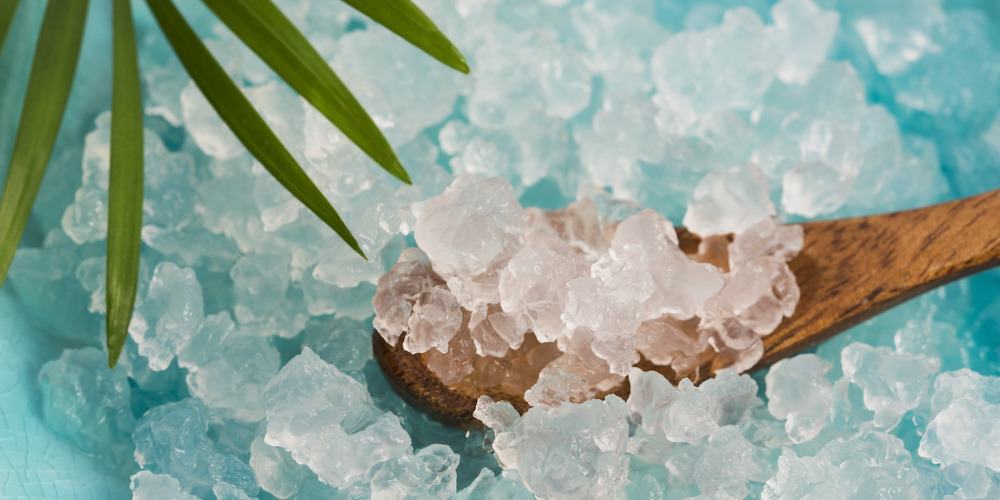BENEFITS OF KEFIR
✓ Enriches gut microbiota
✓ Reduces cholesterol levels
✓ Strengthens the immune system
✓ Relieves skin problems
✓ Potentially anti-cancer
What is kefir?
Kefir is a drink from the Caucasus, a region in eastern Europe that spans Russia, Georgia, Armenia, and Azerbaijan. Known worldwide for its mountain ranges and steppe landscapes, the Caucasus is home to many nomadic shepherds. They prepare this beverage traditionally and have popularized it. Its consumption then spread to other parts of the world starting in the late 19th century.
There are two types of kefir: milk kefir and fruit kefir (or water kefir).
- Milk kefir is a beverage produced from animal milk combined with cultures and yeasts. The result is “kefir grains” that are white and resemble small cauliflower heads. These grains are left to ferment for 24 to 48 hours until a milky drink is obtained.
- Fruit kefir, on the other hand, is obtained from the fermentation of fruits, water, sugar, and water kefir grains. These grains are transparent and look like crystals.
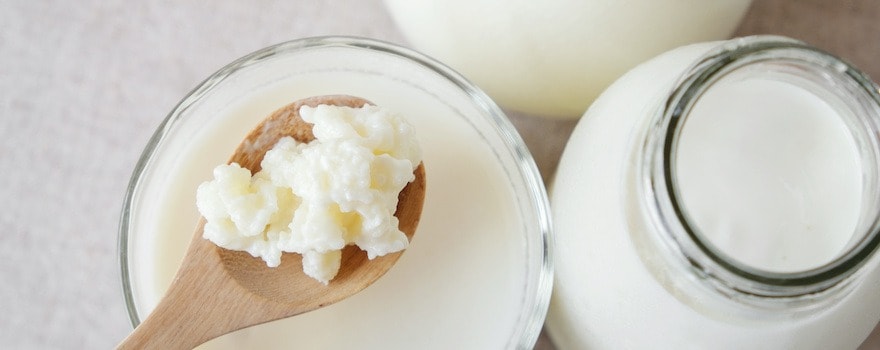
Whether milk or fruit, the resulting drink is slightly fizzy, refreshing, and full of beneficial microorganisms (lactic bacteria and yeasts) as shown in this review.
This drink also contains a wide variety of nutrients: vitamins, minerals, proteins, polysaccharides…
This unique composition gives it properties and health benefits. This drink is now recognized for nourishing gut microbiota, reducing cholesterol levels, strengthening the immune system, and relieving skin problems. Some studies have also shown anti-cancer effects.
Nutritional Composition
- Amino Acids
- Vitamins: A, B (B2, B5, B6, B9, B12), D, K2
- Minerals and Trace Elements: calcium, potassium, magnesium, phosphorus, sodium…
- Proteins
- Probiotics: bacteria and yeasts
- Polysaccharides: kefiran
- Carbohydrates
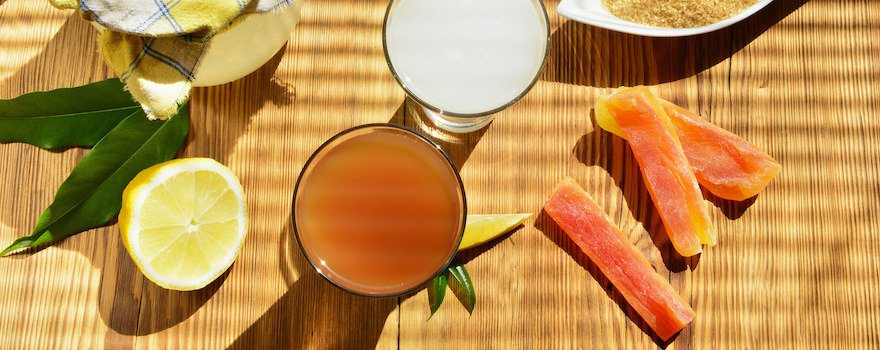
The Benefits of Kefir
♻️ Enriches Gut Microbiota
Thanks to its rich composition of bacteria and yeasts, kefir nourishes and enriches gut microbiota. It is a beverage that supports the existing microbial flora while boosting its activity. Thus, it is considered one of the best natural probiotics.
Milk and fruit kefirs mainly contain lactobacilli, lactococci, and leuconostocs. These lactic bacteria are living microorganisms that ensure the proper functioning of the digestive system. The drink notably increases the quantity of actinobacteria, one of the four major families of gut bacteria. These are composed of bifidobacteria that produce lactic acid, aid digestion, combat bad bacteria, and pathogenic germs.
This study from Hacettepe University (Turkey), conducted on humans, shows how kefir consumption improves the gut microbiota composition.
🍳 Reduces Cholesterol Levels
Kefir helps reduce bad cholesterol levels in the blood and lower blood pressure. The lactobacilli it contains promote the breakdown of cholesterol in the intestine, decreasing its absorption and production by the liver. The bacterium Lactobacillus plantarum is one of the most active: it significantly lowers total cholesterol and hepatic triglycerides.
Moreover, this drink is high in vitamin D and vitamin B5 (pantothenic acid), which can regulate cholesterol and blood triglyceride levels. Finally, with 127 mg per 100 g, it is an excellent source of calcium, whose deficiency is closely linked to the onset of hypercholesterolemia.
This study from the Tianjin University of Science and Technology (China), conducted on mice, shows the hypocholesterolemic effect of kefir’s lactobacilli.
This other study from Jilin University (China), conducted on rats, shows how the bacterium Lactobacillus plantarum in kefir reduces cholesterol and triglyceride levels in the liver.
🛡 Strengthens the immune system
Another interesting action of kefir: it strengthens the immune system and improves the secretion of antibodies by lymphocytes. It’s an immunomodulator capable of regulating the immune response.
Notably, it increases the level of interleukin 5 (IL-5), a glycoprotein that plays a role in stimulating B lymphocytes, the body’s natural defenses. It also improves the production of immunoglobulin A in the small and large intestines. This supports the immunity of the gastrointestinal mucosa.
By making the body’s immune response more efficient, the drink helps combat certain pathogenic bacteria. Thus, it protects against Bacillus cereus, responsible for food poisoning, as well as Salmonella, Helicobacter pylori, and E. coli bacteria.
This study from the University of Moncton (Canada), conducted on mice, shows the positive impact of kefir on intestinal mucosa immunity.
This other study from the Ankara Teaching and Research Hospital (Turkey), conducted on healthy volunteers, shows the increase in interleukin 5 and immunoglobulin A levels through kefir microorganisms.
Finally, this other study from Uludag University (Turkey), conducted on patients infected with Helicobacter pylori, demonstrates the effectiveness of kefir in eradicating the bacteria.
🍑 Relieves skin problems
Thanks to its Lactobacillus kefiri bacteria, kefir is a valuable ally in relieving skin issues such as inflammatory acne, psoriasis, and allergic eczema.
On one hand, it notably inhibits the production of immunoglobulin E (IgE) associated with certain skin diseases such as atopic dermatitis and psoriasis.
On the other hand, it has an anti-inflammatory action that helps reduce the severity and symptoms of dermatological diseases.
Finally, it has a beneficial effect on the wound healing process. Milk grains contain a polysaccharide called “kefiran.” This presents antimicrobial and healing properties and protects skin connective tissue.
This study from Unifenas University (Brazil), conducted on rats, shows the effectiveness of a kefir-based gel on wound healing.
This another study from the same university, conducted on rats, demonstrates the anti-inflammatory and healing activities of kefir.
🔬 Potentially anti-cancer
More recently, some researchers have highlighted the potential of kefir in the prevention and treatment of colon, skin, breast, and stomach cancers.
On one hand, it would slow down the development and proliferation of cancer cells. On the other hand, it would also induce apoptosis (programmed cell death). Its anti-cancer action seems to be linked to the peptides, polysaccharides, and sphingolipids (complex lipids) it contains.
This review from Isfahan University of Medical Sciences (Iran) focuses on the effects of this drink in cancer prevention and treatment.
This study from the American University of Beirut (Lebanon), conducted on cancer cells, shows the effectiveness of kefir in inhibiting proliferation and inducing apoptosis of malignant T lymphocytes.
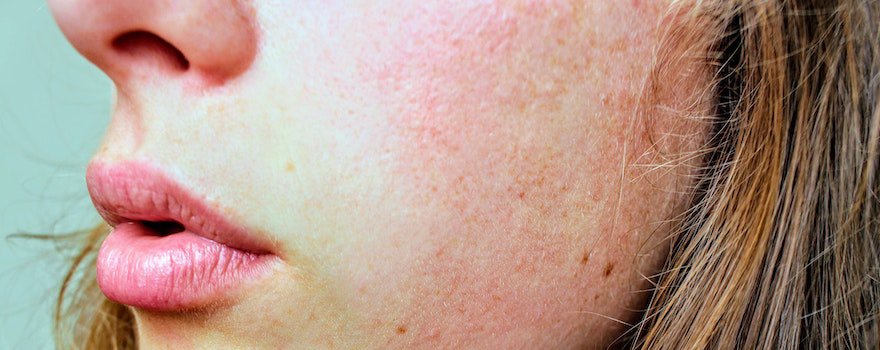
How to consume kefir?
Milk kefir
Milk kefir is prepared with sheep, goat, or cow milk. The longer the fermentation, the thicker its texture and more acidic its flavor. It has a taste comparable to yogurt, both sour and creamy.
Additionally, the bacteria it contains convert lactose into lactic acid. In the end, milk kefir is quite low in lactose and generally well-tolerated by sensitive individuals.
You can consume it plain or flavor it with vanilla, sugar, lucuma powder, honey… The milk drink easily fits into smoothies and can be used to replace buttermilk in baked goods.
Finally, you can also add 1 teaspoon of milk kefir to your cosmetics (cleanser, face, mask…) to rebalance the skin flora.
Fruit Kefir
To prepare fruit kefir, one generally uses lemon, fig, orange, or apricot left to ferment in sugared water with water kefir grains.
The fruit beverage has a slightly tangy taste and is more subtle than that of milk. It is also more refreshing. It is often compared to Kombucha, a traditional Russian drink, resulting from the cultivation of yeasts and bacteria in a sweet tea infusion.
As with milk kefir, you can flavor it with herbs and spices (ginger, mint, verbena…) or freshly squeezed lemon.

Coconut Water Kefir
Coconut water is ideal as a base for fermenting water kefir grains because it naturally contains sugars. Simply mix the two ingredients in a jar and let it ferment for 48 hours at room temperature.
This coconut water beverage has the advantage of being vegan. You can enjoy it with dried fruits or berries: goji berries, açaí berries…
Powdered Kefir
To make your own kefir, some brands offer ready-made powder, including sugar and freeze-dried cultures. You only need to mix the powder in water, add fruit (for fruit kefir), and let it ferment for 48 hours. Practical and quick for a delicious drink!
Dehydrated Kefir Grains
You can find dehydrated kefir grains for making milk or fruit drinks. To rehydrate them, soak them in a glass of fresh milk or water. The rehydration process may take several days.
Kefir and Medicinal Plants
To optimize your transit and nourish the intestinal microbiota, it can be paired with other natural probiotics like miso and spirulina.
Moreover, it is also a slimming ally that, in combination with fat-burning foods, can help with weight loss.
To reduce bad cholesterol levels, enjoy it with Brazil nuts, basil seeds, or hemp.
Consume Sustainably: Prioritize Organic, Local, and Fair Trade Kefir
✓ France has numerous producers of natural and artisanal kefir, made with organic ingredients and local products, free from additives and flavors.
✓ If you wish to create your own drink, preferably choose grains from a culture based on organic products (milk, sugar, organic fruits…).
✓ If the kefir does not come from France, find out about its exact origin and favor fair trade channels to support local producers.
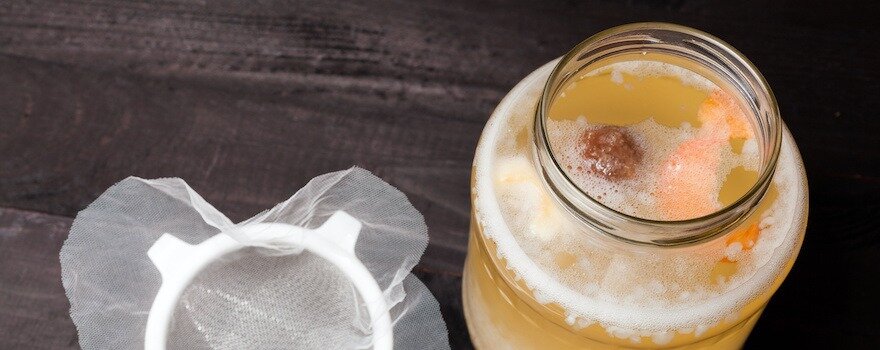
Dosage
It is recommended to drink between 200 and 300 ml of kefir per day (about 1 cup). Start gradually (100 ml per day) then increase your daily intake based on your body’s reactions.
To achieve results, drink kefir every day for at least 3 months.
Contraindications and Side Effects
Consuming kefir is not dangerous but has some contraindications:
- As a precaution, it is not recommended for pregnant or breastfeeding women and young children
- People with autoimmune diseases, irritable bowel syndrome, or Crohn’s disease should avoid consuming it
- Individuals sensitive to caseins and yeasts should consume it with caution.
Excessive consumption can lead to the following adverse effects:
- Constipation
- Abdominal cramps
- Bloating
- Diarrhea
If you experience side effects, stop consumption and consult a doctor.
History, Culture, and Market of Kefir
In Turkish, “kefir” means “to feel good.” A promising name! It is a drink consumed for centuries by the nomadic peoples of the Caucasus. It is said to have come about by chance. The nomadic peoples, accustomed to storing milk in leather gourds, ended up with it fermenting. Some also attribute its origin to Japan and Tibet.
In Europe, kefir was introduced around 1860. Its quality depends on numerous factors: origin, composition and quality of the milk and grains, production conditions, technology used… Thus, certain fermentation conditions (duration and temperature) can optimize the anticancer properties of this drink as shown in this review.
Document prepared by Julia Perez and Charlotte Jean
Sources and scientific studies
Analy Machado de Oliveira Leite, Marco Antonio Lemos Miguel, Raquel Silva Peixoto, Alexandre Soares Rosado, Joab Trajano Silva, Vania Margaret Flosi Paschoalin, 2013. Microbiological, technological and therapeutic properties of kefir: a natural probiotic beverage.
Maria R. Prado, Lina Marcela Blandón, Luciana P. S. Vandenberghe, Cristine Rodrigues, Guillermo R. Castro, Vanete Thomaz-Soccol, and Carlos R. Soccol, 2015. Milk kefir: composition, microbial cultures, biological activities, and related products.
Ezgi Bellikci-Koyu, Banu Pınar Sarer-Yurekli, Yakut Akyon, Fadime Aydin-Kose, Cem Karagozlu, Ahmet Gokhan Ozgen, Annika Brinkmann, Andreas Nitsche, Koray Ergunay, Engin Yilmaz, Zehra Buyuktuncer, 2019. Effects of Regular Kefir Consumption on Gut Microbiota in Patients with Metabolic Syndrome: A Parallel-Group, Randomized, Controlled Study.
Yanping Wang, Nv Xu, Aodeng Xi, Zaheer Ahmed, Bin Zhang, Xiaojia Bai, 2009. Effects of Lactobacillus plantarum MA2 isolated from Tibet kefir on lipid metabolism and intestinal microflora of rats fed on high-cholesterol diet.
Ying Huang, Xiaojun Wang, Jinfeng Wang, Fei Wu, Yujie Sui, Longfei Yang, Zonggui Wang, 2013. Lactobacillus plantarum strains as potential probiotic cultures with cholesterol-lowering activity.
Gabriel Vinderola, Gabriela Perdigón, Jairo Duarte, Edward Farnworth, Chantal Matar, 2006. Effects of the oral administration of the products derived from milk fermentation by kefir microflora on immune stimulation.
Ali Kudret Adiloğlu, Nurettin Gönülateş, Mehmet Işler, Altuğ Senol 2013. The effect of kefir consumption on human immune system: a cytokine study.
Sandra Rizk, Katia Maalouf, Elias Baydoun, 2009. The antiproliferative effect of kefir cell-free fraction on HuT-102 malignant T lymphocytes.
Kamila Leite Rodrigues, Lucélia Rita Gaudino Caputo, Jose Carlos Tavares Carvalho, João Evangelista, Jose Maurício Schneedorf, 2004. Antimicrobial and healing activity of kefir and kefiran extract.
M E C Moreira, M H Dos Santos, G P P Zolini, A T B Wouters, J C T Carvalho, J M Schneedorf, 2008. Anti-inflammatory and cicatrizing activities of a carbohydrate fraction isolated from sugary kefir.
Nahid Rafie, Sahar Golpour Hamedani, Reza Ghiasvand, Maryam Miraghajani, 2015. Kefir and Cancer: A Systematic Review of Literatures.
Sandra Rizk, Katia Maalouf, Elias Baydoun, 2009. The antiproliferative effect of kefir cell-free fraction on HuT-102 malignant T lymphocytes.
Athéna Zourari, E.M. Anifantakis, 1988. Kefir. Physicochemical, microbiological, and nutritional characteristics. Production technology. A review.


